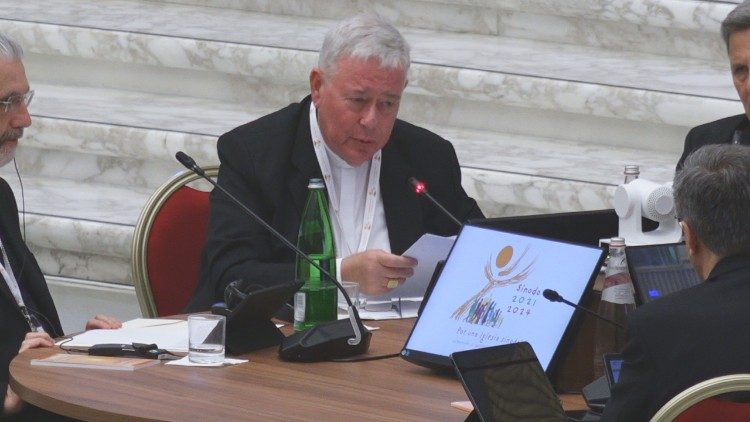Cardinal Jean-Claude Hollerich, the Relator General for the Synod of Bishops, encourages members of the General Assembly to renew their commitment to their work before presenting the next module, focusing on “Participation, governance, authority: What processes, structures, and institutions are needed in a missionary synodal Church?”
By Christopher Wells
Cardinal Jean-Claude Hollerich, the Relator General for the Synod of Bishops, began his presentation on the fourth module by encouraging participants to renew their commitment to their work, reminding them that the first session of the General Assembly “coincides with the beginning of an equally important phase of the process: the time between the two sessions.”
He explained that after the conclusion of the session, participants will be asked to return to their Churches with “the fruits of their work” and to accompany “those local processes that will provide us with the elements to conclude our discernment next year.”
Synod will be evaluated on basis of changes
Going on to present the next “module” to be considered, Cardinal Hollerich noted that “this Synod will be evaluated on the basis of the perceivable changes that will result from it.” He said that people “are especially interested in the small but sensitive changes to the issues that we are preparing to tackle in this Module.”
These include: the renewal of the service of authority; the practice of discernment in common; the question of which structures and institutions “are more in line with a synodal Church”; how local churches can work together; and the role of the Synod itself in a more synodal Church.
Delicate issues requiring discernment
“These are delicate issues, which require careful discernment,” Cardinal Hollerich said. “They are delicate because they touch the concrete life of the Church and also the growth dynamism of the tradition: a wrong discernment could sever it, or freeze it.” He invited participants to call upon the theological and canonical experts present at the General Assembly to assist them in their deliberations.
The Relator General also encouraged participants not to get sidetracked by tangential questions, and asked facilitators to keep them on task, “even with a bit of decisiveness.”
After expressing his hopes for “fruitful work in this Module,” Cardinal Hollerich concluded his presentation by stating, “Missionary discipleship or co-responsibility are not just catchphrases, but a call that we can only realize together, with the support of concrete processes, structures and institutions that truly work in the spirit of synodality.”
Source: VATICAN NEWS

